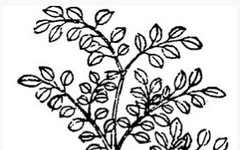The “Shen Nong Ben Cao Jing” states: Astragalus (Huang Qi), with a sweet taste and slightly warm nature, is indicated for long-term ulcers and abscesses, capable of expelling pus and alleviating pain; it treats severe skin diseases caused by wind pathogens, five types of hemorrhoids, and anal fistula; it can also tonify deficiencies to treat various pediatric diseases. Astragalus, also known as Dai Shan, grows in mountainous areas with flowing water.
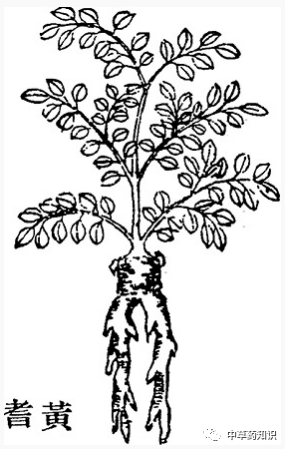
[Original Text] Astragalus (Huang Qi), sweet in taste and slightly warm in nature, is indicated for long-standing ulcers and abscesses, expelling pus and alleviating pain; it treats severe skin diseases caused by wind, five types of hemorrhoids, and tonifies deficiencies in children’s diseases. Also known as Dai Shan, it grows in valleys.
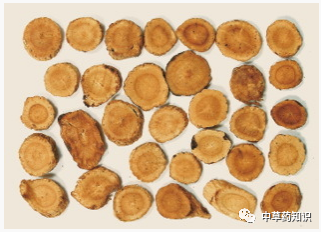
[Name Explanation] Astragalus, also known as Huang Qi, is primarily produced in Inner Mongolia, Shanxi, and Heilongjiang; it is now widely cultivated. The fruiting period of Astragalus is from July to September, generally harvested in spring and autumn, removing soil, fibrous roots, and root tips, then sun-dried until about 60-70% dry, and bundled for further drying.
The “Ben Jing” states that Astragalus has a sweet taste and slightly warm nature, capable of treating various acute, localized, purulent inflammations on the surface or internal organs; it can heal long-standing ulcers, expel pus, and alleviate pain; it is used for leprosy, various hemorrhoids, and lymphatic tuberculosis; it improves symptoms of weakness in the body; it can also treat various pediatric conditions.
Ancient practitioners believed that the effects of Astragalus include: 1. Tonifying various symptoms of deficiency; 2. Supplementing original qi and enhancing organ function; 3. Strengthening the spleen and stomach; 4. Resolving heat toxins in the muscles; 5. Expelling pus and alleviating pain, promoting blood circulation and generating blood, making it an excellent remedy for abscesses, ulcers, and boils. Medical texts state that Astragalus is also known as Huang Qi, where Qi means elder, praising its status as a leading qi-tonifying herb, indicating its importance among qi tonics. Modern medical research has proven that Astragalus can enhance the body’s resistance, delay cellular aging, and has antioxidant effects, regulating the immune function of the body. The efficacy of Astragalus is closely related to its rich trace element selenium, which is primarily absorbed from the soil. Therefore, the quality of Astragalus is largely determined by its growing region. Historically, it has been widely believed that the best quality Astragalus comes from Taiyuan in Shanxi, followed by Tai Mountain. The soil in these areas is rich in selenium. However, due to recent exploitative development and ecological imbalance, the quality of wild Astragalus has declined.
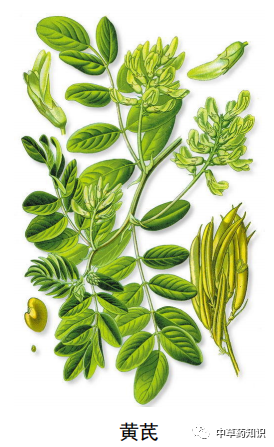
Astragalus has a wide range of applications in modern clinical practice, in addition to tonifying deficiencies: 1. Treating strokes, hemiplegia, limb numbness, and cerebral anemia caused by qi deficiency and blood stagnation. 2. Tonifying qi and warming yang, used for treating spleen and stomach qi deficiency, fatigue, poor appetite, and loose stools. 3. Treating various hemorrhagic diseases such as epistaxis, hematochezia, menorrhagia, and purpura. 4. Treating chronic diarrhea, dysentery, prolapse of the rectum, organ prolapse, and miscarriage caused by sinking qi. 5. Tonifying the lungs and securing the exterior, treating deficiency cough, night sweats, and qi deficiency. 6. Promoting urination and reducing swelling. 7. Treating diabetes. 8. Expelling sores, draining pus, and promoting tissue regeneration. 9. Treating leukorrhea (chyluria, etc.). 10. Enhancing the effects of anti-cancer drugs and reducing chemotherapy side effects. Although Astragalus is now widely used in clinical practice, its contraindications should still be noted. Since Astragalus can raise yang and assist fire, it is not suitable for patients with excessive pathogenic factors, no sweating, dampness obstruction, anorexia, or those with yang hyperactivity and toxic heat.
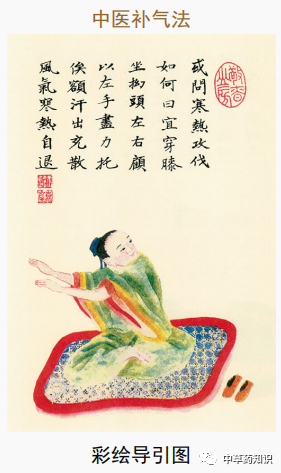
In TCM, qi is a substance that runs throughout the body to maintain bodily functions. Qi is also known as original qi or true qi, generated from the essence of the kidneys and nourished by postnatal essence, it is the fundamental energy of the body and the driving force of life activities. It is primarily governed by the lungs, meaning the lungs control qi and respiration, so qi tonics generally enter the lung meridian. Qi in a specific organ is referred to as that organ’s qi, such as kidney qi in the kidneys; middle qi in the spleen and stomach; and meridian qi in the meridians. If qi is deficient, symptoms such as weakness, shortness of breath, pale complexion, fatigue in the limbs, dizziness, sweating upon exertion, and low voice may appear. Astragalus is an important qi-tonifying herb, capable of benefiting qi throughout the body, securing the exterior, tonifying middle qi, raising clear qi, expelling toxic pus, and promoting urination, making it an excellent product for warming, nourishing, and strengthening health. Other commonly used qi tonics include ginseng (Ren Shen), codonopsis (Dang Shen), white atractylodes (Bai Zhu), licorice (Gan Cao), Chinese yam (Shan Yao), and polygonatum (Huang Jing).
[Therapeutic Formulas] (For reference only)
For urinary obstruction
Take 6 grams of Astragalus, add 480 milliliters of water, decoct to 240 milliliters, and take warm. For children, reduce the dosage by half.
For alcoholic jaundice (after drinking, with red, black, and yellow spots on the body)
62 grams of Astragalus and 31 grams of magnolia bark. Grind the herbs together finely, take a small amount each time, three times a day, with wine.
For constipation in the elderly
15.6 grams each of Astragalus and dried tangerine peel. Grind the herbs finely, and use 15 grams of hemp seeds, crushed, add water to extract the juice, decoct until half dry, mix in 15 milliliters of honey, and boil again, then add the powdered Astragalus and dried tangerine peel, mix well and take. Two doses can relieve constipation and can be taken regularly.
For blood lin
Equal parts of Astragalus and Coptis, ground into powder. Make into pills the size of mung beans, take 3 pills each time.
For scanty urination
Equal parts of Astragalus and ginseng, ground into powder. Use four to five slices of radish, slightly roasted with honey, dip in the powdered herbs and take, with salt water.
For hemoptysis
7.8 grams of Astragalus and 15 grams of purple-backed duckweed. Grind the herbs together, take 3 grams with ginger honey water each time.
For cough with pus and blood, dry throat
125 grams of Astragalus and 31 grams of licorice. Grind the herbs together, take 6 grams with hot water each time.
For lung abscess
62 grams of Astragalus, ground finely, take 6 grams each time as a decoction, can be taken three to four times a day.
For damp-heat itching
After frying Astragalus in wine, grind it into powder, and eat it dipped in cooked pig heart, the effect is very good.
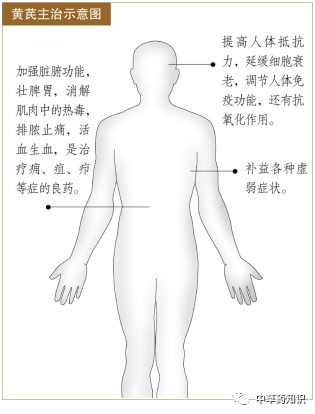
Source: Knowledge of Chinese Herbal Medicine

